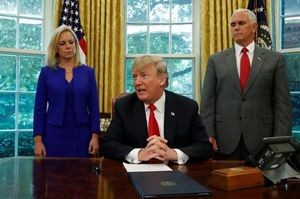In a bold declaration, former President Donald Trump has labeled April 2, 2025, as "Liberation Day," claiming that the United States will finally free itself from what he describes as the shackles of unfair competition through the implementation of worldwide tariffs. This statement is not just a rallying cry for his supporters; it raises significant questions about the future of international trade and the role of the United States on the global stage.
Trump's announcement comes amid growing discontent among American workers, particularly in manufacturing sectors that have faced stiff competition from abroad. As jobs continue to vanish, many are left wondering whether Trump's tariffs are a genuine response to a legitimate grievance or merely political theatrics designed to resonate with his base. The former president's rhetoric suggests a deep-seated frustration with the current state of global trade, but is this frustration shared by the broader American public?
According to Trump, the tariffs are intended to protect American jobs and industries from what he perceives as unfair practices by other nations. However, critics argue that such measures could lead to retaliation from trading partners, ultimately harming American consumers and businesses. The stakes are high, and the potential fallout from these tariffs could reverberate throughout the economy.
In a related development, Australian Prime Minister Anthony Albanese has responded to Trump's tariffs by announcing a $50 million support package aimed at mitigating the impact on Australian industries. Albanese described the U.S. tariffs as "unwarranted," highlighting the growing tension between the two nations over trade policies. This move underscores the potential for international fallout as countries react to Trump's aggressive trade stance.
As the U.S. grapples with its position in the world, the question arises: has America grown weary of its role as the guarantor of global free trade? The United States has long been viewed as a champion of open markets, but the recent shift towards protectionism signals a potential departure from this longstanding commitment. This shift raises eyebrows, especially considering that the U.S. remains dominant in global technology and financial services.
Furthermore, the U.S. dollar, often regarded as the world's most trusted currency, plays a pivotal role in international trade. However, the erosion of trust in U.S. trade policies could jeopardize this status. If other nations begin to question the reliability of American commitments, the implications for the global economy could be profound. After all, the dollar's strength is closely tied to the perception of the U.S. as a stable and trustworthy partner.
The question remains whether Trump's tariffs will ultimately serve as a bargaining tactic or if they represent a more profound shift in U.S. trade policy. Many analysts are left pondering the long-term consequences of these tariffs on America's relationships with its allies and trading partners. Could this be the beginning of a new era in global trade, one characterized by isolationism and protectionism?
In the short term, the tariffs may inflict significant pain on foreign competitors, but the long-term effects could be detrimental to the U.S. economy itself. As businesses adjust to new trade barriers, consumers may face higher prices for goods and services. This could lead to a ripple effect, impacting everything from inflation rates to consumer spending.
As the debate over Trump's tariffs continues, it is clear that the ramifications of this policy will extend far beyond American borders. Other nations are closely monitoring the situation, and many are preparing to respond in kind. The global trading system, which has been built on the principles of free trade and cooperation, could be at risk of unraveling.
In conclusion, as April 2, 2025, approaches, the world watches closely to see how Trump's tariffs will unfold and what impact they will have on international relations. Will the U.S. emerge as a more isolated power, or will it find a way to balance its interests with those of its global partners? Only time will tell, but the stakes have never been higher.




